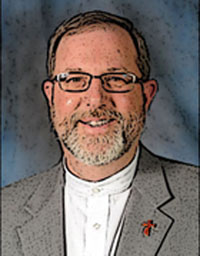Justice Perspective: Migration crisis should be guided by best interest of child
by DEACON DON WEIGEL
They come across the border, fleeing the situation back home, sometimes brought into the U.S. by "coyotes" - the name for the paid "guides" who transport them. Since last October, there have been more than 60,000 of them who have been apprehended - and many more who have escaped detection. Recent government estimates are that more than 90,000 will come across the border in this fiscal year, and that number is likely to increase to more than 130,000 next year.
The technical term for them is "UACs" - "unaccompanied alien children." They are boys and girls, teens and kids you would expect to be playing soccer at recess rather than making a dangerous journey of hundreds of miles to cross a treacherous river into the U.S. They come primarily from three Central American countries: Honduras, Guatemala and El Salvador.
You might remember your social studies lessons about migration - that there are "pull" factors like economic opportunity in the destination country, and there are "push" factors, like intolerable living conditions in the country of origin. In this case, the factors are all "push" - these children are coming here mainly to flee the gang violence and the breakdown of the rule of law in their countries that can no longer keep them safe.
I had the opportunity to be in El Salvador at the end of June with the Maryknoll Friends Across Borders program, and I saw firsthand the fear of the violence and gang activity there. No one goes out after dark. Everyone avoids areas that are reputed to be gang territory, sometimes traveling out of their way if necessary. The gangs have infiltrated many schools and have worsened the existing lack of economic and educational opportunities.
In response, parents have sent their children to be with relatives already in the U.S., or have sent for their children that they had left with grandparents or other relatives as they came into the U.S. looking for work. Because once children are recruited, or coerced to join, or become the object of gang attention, their life will be one of violence, crime, and will likely end either in imprisonment or death. Sending their children to the U.S. is the ultimate, desperate act of loving parents.
While many might see this crisis only as a political issue, or an economic issue, or a security issue, as Catholics we are called to see it as a humanitarian issue. An exceptionally well-written explanation of the Church's position on this crisis was delivered by Bishop Mark Seitz of El Paso, Texas, to the House Judiciary Committee in late June. In brief, he insisted on making all decisions regarding this issue by using a "best interests of the child" standard - providing for them while they are here, and finding the best solution to their placement by involving family members in the decision, regardless of their geography.
If we really do believe in the infinite dignity of every human being, we have to insist to our elected officials that any proposal for dealing with this crisis must be in the best interests of the child as a guiding principle. In every conversation we have with others we have to put the child and the family first.
Jesus Himself was a child migrant fleeing violence. Jesus, Mary and Joseph were asylum-seekers and faced the same choice as the one facing thousands of children fleeing to the United States each year. Will we find a way to welcome them or make excuses why we can't?
Deacon Don Weigel is the associate public policy coordinator at Catholic Charities of Buffalo and an instructor at Christ the King Seminary. He may be reached via email.




